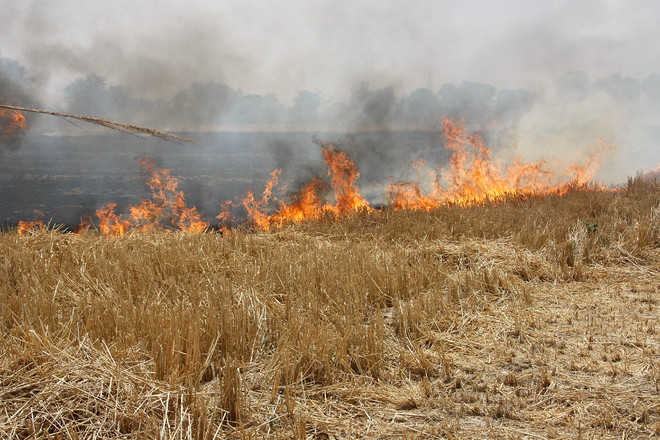
Aman Sood
Tribune News Service
Patiala, November 5
Each year, air quality in Punjab deteriorates after paddy is harvested. But the Punjab Pollution Control Board (PPCB) has no mechanism to record the air quality index (AQI). The state depends on the air monitoring stations in six cities, whereas stubble-burning occurs in villages.
On Monday, even as a thick smog engulfed hundreds of Patiala villages, the air quality, as per the PPCB rating, was “moderate”, (0-50 good, 51-100 satisfactory, 101-200 moderate, 201-300 poor, 301-400 very poor and 401-500 severe) with respirable suspended particulate matter (RSPM) recorded at 135.
“For measuring AQI, the six stations in the cities depend on the flow of air through their machines despite the fact that wind velocity is as low as 2 km per hour for most part of the day,” say officials.
On Monday, the AQI in Mandi Gobindgarh was recorded at 123, in Ludhiana 91, Jalandhar 174, Amritsar 135, Khanna 112, Bathinda 43 and Rupnagar 103.
Sources say PPCB officials have about 40 portable machines to record air quality in villages. “The ratings on these machines tell a different story with air quality in the ‘poor to very poor’ category in terms of particulate matter.”
Data compiled by these machines shows that Bara Pind near Goraya recorded RSPM at 135 and 228, Binjon in SBS Nagar at 176 and 179, Ram Tirath Pura in Amritsar at 133 and 185, Mehna in Moga at 147 and 186 and Rakhra in Patiala at 108 and 163 on October 9 and October 17.
“We have limited resources to monitor air quality in villages and the readings taken through portable devices only tell particulate matter reading and not the AQI,” explained PPCB member secretary Krunesh Garg. “The AQI stations in the cities give an accurate reading. Compared with last year, the pollution has been less this paddy season.”
An AQI station requires an investment of Rs 1 crore — Rs 80 lakh as installation charges and Rs 20 lakh as running expenditure. “Till enough funds are received, we will have to rely on AQI stations in the cities,” said a PPCB official.
KS Pannu, Secretary, Agriculture, and former PPCB chief, admitted there was a need for more such stations. However, he said these would be useful for only two months during the paddy season.


























